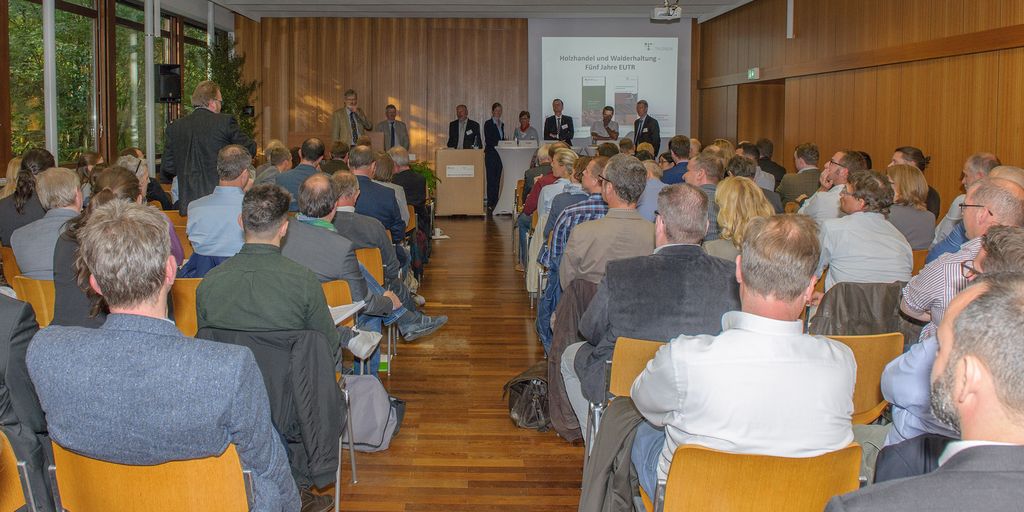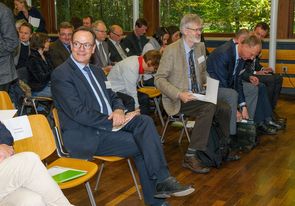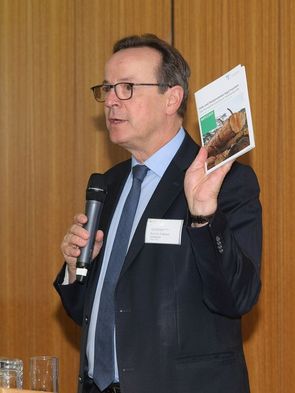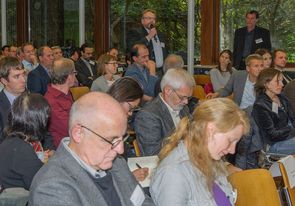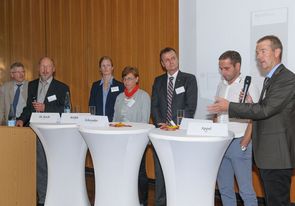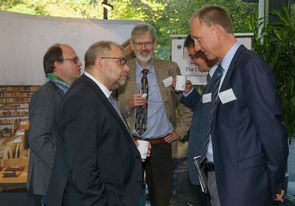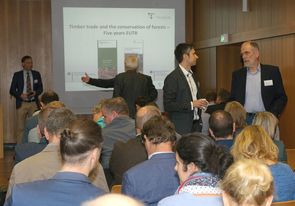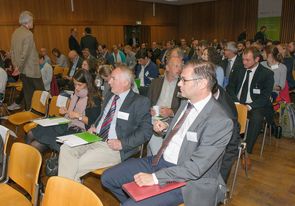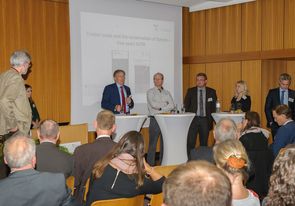Five years of the European Timber Regulation (EUTR), and at the same time the 5th anniversary of the Thünen Centre of Competence on the Origin of Timber: this was the occasion for the international event "Timber trade and the conservation of forests" held on October 8-9, 2018 at the Thünen Institute in Hamburg. The German Federal Ministry of Food and Agriculture (BMEL) had invited participants from Germany, other EU Member States, the EU Commission and the USA. The conference considered experiences to date in order to draw conclusions for successful further development.
Five years after the enactment of the EUTR, both “light and shadow” can be seen in the implementation, according to Matthias Schwoerer from the BMEL in his opening remarks. While EUTR implementation in Germany and the other EU Member States has now made clear progress, the consistent application of the rules within the EU remains a challenge. Nevertheless, as Tobias König from the discounter LIDL emphasized, the awareness of this topic has increased significantly among retail companies and producer countries. This is also documented by the steadily growing number of test orders received the Centre of Competence, particularly from the private sector (timber trading companies, discounters, home stores, the furniture industry, etc.).
According to Jörg Appel of the competent authority BLE, there were around 27,000 market participants in Germany in 2017, of which the vast majority, however, concentrate in areas other than wood products. A total of only 380 companies covered the bulk of the market volume. But all companies must fulfill the requirements of the EUTR (provision of information, risk assessment, risk reduction if necessary). Only a quarter of the inspections carried out were without complaints, documents were often missing. However, the inspections make an impact, as shown by subsequent reports.
The EUTR is still not implemented equally in each EU Member State, which is particularly deplored by the involved companies who fear competitive disadvantages. The representative of the EU Commission reiterated that intensive work was being done in the Expert Group of the competent authorities in Brussels. Corruption and a lack of political will are major obstacles to legal logging and sustainable timber use in the countries exporting tropical timber, according to Indra van Gisbergen from FERN. However, according to Tom van Loon from Interholco, it is both possible and desirable to source legally and sustainably produced tropical timber, as these structures benefit the local economy and the people employed there.
A survey conducted by the Thünen Institute on the impact of EUTR in Germany showed that many small companies as well as companies outside the timber sector are not properly informed about the EUTR. Of well-informed companies, 32% have changed their trading partners from exporting countries (such as Myanmar or African countries) and 17% have adapted their assortments (e.g., waiving teak imports). Timber imports to the EU have increased since the introduction of the EUTR, but clear statements regarding timber trade development since the enactment of the EUTR are not yet possible for tropical timber.
The methods and expertise of the Thünen Centre of Competence with regard to the genetic determination of species and origin, as well as the anatomical determination (especially in paper, fiberboard and charcoal) have been developed further in recent years.
An evening reception on a ship in the port of Hamburg fostered additional discussions and contacts outside the lecture program.
October 8, 2018: lecture sheets (in German)
Nachhaltige Beschaffung von holzbasierten Produkten bei einem großen Discounter
Tobias König (LIDL)
Kontrolle der EUTR: Erfahrungen und Entwicklungen
Jörg Appel (BLE)
Mittel zur Umsetzung der EUTR und Wirksamkeit
Michael Kutschke (NEPCon)
5 Jahre EUTR – mit hohem Aufwand zum Erfolg für den Holzimport
Thomas Goebel (GD Holz)
Anwendung genetischer Methoden zur Bestimmung von Holzart und –herkunft
Hilke Schroeder (Thünen-Institut)
Holzartenbestimmung als wichtiger Beitrag für die Umsetzung der EUTR
Habil Gerald Koch (Thünen-Institut)
Erfahrungen im Institut für Internationale Waldwirtschaft und Forstökonomie
Ulrich Bick(Thünen-Institut)
Implementierung der EUTR in Deutschland
Margret Köthke (Thünen-Institut)
October 9, 2018: lecture sheets (in English)
Timber Trade and the EUTR
Holger Weimar, Georg Becher (Thünen Institute)
FLEGT: developments in Africa
Indra van Gisbergen (FERN)
Even Implementation of EUTR
Dörte Pardo-Lopez (European Commission)
EUTR implementation in United Kingdom
Deanne Hughes (Competent Authority UK)
EUTR implementation in Spain
Paloma Torroba Balmori (Competent Authority ES)
Sustainable supply of tropical timber
Gerhard Dieterle (International Tropical Timber Organization – ITTO)
Sustainable hardwood – Made in Africa: Our experience in forest management and timber trading
Tom van Loon (Interholco)
Supporting Lacey Act Compliance
Shelley Gardner (US Forest Service, US Department of Agriculture)
How EUTR and Lacey Act can support each other
Elinor Colbourn (Environmental Crimes Section, US Department of Justice)
Update on identification of timber origin with stable isotopes
Markus Boner (Agroisolab)
Status of Global Timber Tracking Network
Jo van Brusselen (EFI)

